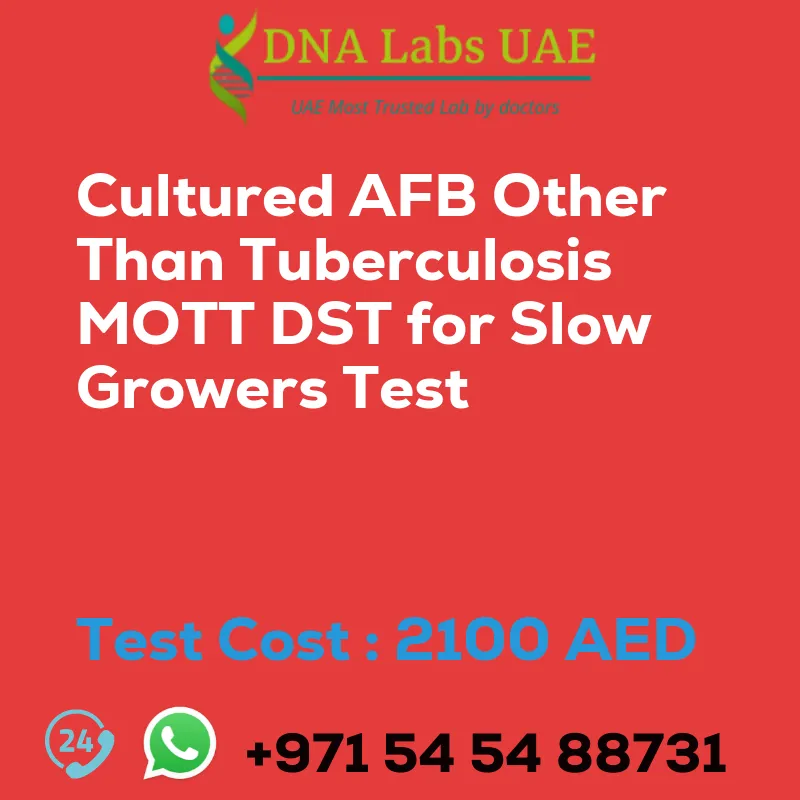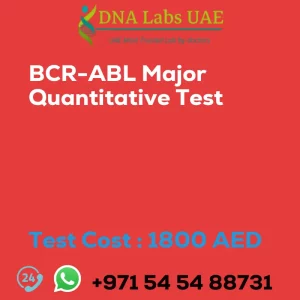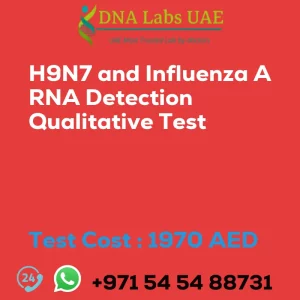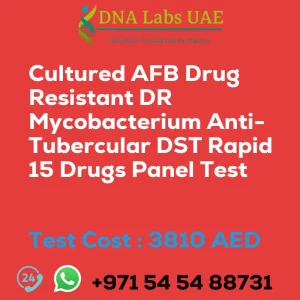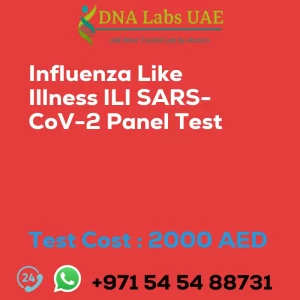CULTURED AFB OTHER THAN TUBERCULOSIS MOTT DST FOR SLOW GROWERS Test
Test Cost: AED 2100.0
Symptoms and Diagnosis
The Cultured AFB Other Than Tuberculosis MOTT DST for Slow Growers test is a laboratory test used to determine the susceptibility of slow-growing mycobacteria to different antimicrobial drugs. Slow-growing mycobacteria are a group of bacteria that include species other than Mycobacterium tuberculosis, the causative agent of tuberculosis. These bacteria have a slower growth rate compared to M. tuberculosis and require specialized culture techniques for their isolation and identification.
Test Components and Sample Condition
Test Components: Cultured AFB Other Than Tuberculosis MOTT DST for Slow Growers
Price: AED 2100.0
Sample Condition: Submit pure growth of MOTT on appropriate media in a sterile screw-capped container in a sealed plastic bag. Ship refrigerated. Alternatively, when used with other AFB culture or Mycobacteria identification tests, the pure growth (MOTT) obtained in the laboratory specimens already submitted will be processed for MOTT Drug Sensitivity.
Report Delivery
Sample daily by 3.30 pm; Report 14 days
Method
Broth Microdilution (MIC)
Test Type
Tuberculosis
Doctor
Physician
Test Department
Pre Test Information: No special preparation required
Test Details
The Cultured AFB (Acid-Fast Bacilli) Other Than Tuberculosis (MOTT) DST (Drug Susceptibility Test) for Slow Growers is a laboratory test used to determine the susceptibility of slow-growing mycobacteria to different antimicrobial drugs. Slow-growing mycobacteria are a group of bacteria that include species other than Mycobacterium tuberculosis, the causative agent of tuberculosis. These bacteria have a slower growth rate compared to M. tuberculosis and require specialized culture techniques for their isolation and identification.
The Cultured AFB MOTT DST test involves culturing the slow-growing mycobacteria in the presence of different antimicrobial drugs. The drugs tested may include first-line drugs such as isoniazid, rifampicin, ethambutol, and streptomycin, as well as second-line drugs such as fluoroquinolones and injectable drugs like amikacin and kanamycin. The test determines the minimum inhibitory concentration (MIC) of each drug for the specific slow-growing mycobacterial species. The MIC is the lowest concentration of a drug that prevents visible growth of the bacteria in the culture.
By comparing the MIC values with established breakpoints, the test can determine whether the bacteria are susceptible, intermediate, or resistant to each drug. The Cultured AFB MOTT DST test is important for guiding the appropriate treatment of infections caused by slow-growing mycobacteria. It helps healthcare providers choose the most effective antimicrobial drugs to treat these infections and avoid the development of drug resistance.
| Test Name | CULTURED AFB OTHER THAN TUBERCULOSIS MOTT DST FOR SLOW GROWERS Test |
|---|---|
| Components | |
| Price | 2100.0 AED |
| Sample Condition | Submit pure growth of MOTT on appropriate media in sterile screw capped container in a sealed plastic bag. Ship refrigerated ORwhen used with other AFB culture or Mycobacteria identification tests the pure growth (MOTT) obtained in the Laboratory specimens already submitted will be processed for MOTT Drug Sensitivity. |
| Report Delivery | Sample Daily by 3.30 pm; Report 14 days |
| Method | Broth Microdilution (MIC) |
| Test type | Tuberculosis |
| Doctor | Physician |
| Test Department: | |
| Pre Test Information | No special preparation required |
| Test Details |
The Cultured AFB (Acid-Fast Bacilli) Other Than Tuberculosis (MOTT) DST (Drug Susceptibility Test) for Slow Growers is a laboratory test used to determine the susceptibility of slow-growing mycobacteria to different antimicrobial drugs. Slow-growing mycobacteria are a group of bacteria that include species other than Mycobacterium tuberculosis, the causative agent of tuberculosis. These bacteria have a slower growth rate compared to M. tuberculosis and require specialized culture techniques for their isolation and identification. The Cultured AFB MOTT DST test involves culturing the slow-growing mycobacteria in the presence of different antimicrobial drugs. The drugs tested may include first-line drugs such as isoniazid, rifampicin, ethambutol, and streptomycin, as well as second-line drugs such as fluoroquinolones and injectable drugs like amikacin and kanamycin. The test determines the minimum inhibitory concentration (MIC) of each drug for the specific slow-growing mycobacterial species. The MIC is the lowest concentration of a drug that prevents visible growth of the bacteria in the culture. By comparing the MIC values with established breakpoints, the test can determine whether the bacteria are susceptible, intermediate, or resistant to each drug. The Cultured AFB MOTT DST test is important for guiding the appropriate treatment of infections caused by slow-growing mycobacteria. It helps healthcare providers choose the most effective antimicrobial drugs to treat these infections and avoid the development of drug resistance. |

